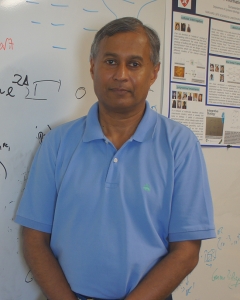Jeremy Gunawardena, 2017

Who he is
I am pure mathematician by upbringing. I came to biology by accident, having spent several years in industry at Hewlett-Packard Research Labs. At the time, I had a strong belief that ideas from pure mathematics could help to analyse complex systems. It took me a while to realise that computing systems are complicated but not complex. The Human Genome project revealed that true complexity is found in biology and brought me, eventually, to Harvard. The transition into biological culture was an interesting experience. Two of the lessons I learned were that what is most important in biology is not written down and if you want to be taken seriously, somebody has to do an experiment. The Department of Systems Biology provided a wonderfully supportive environment for this transition.
What he does
My lab studies cellular information processing. We are broadly interested in how cells detect signals from their environment, process them and make decisions about what to do. These questions are fundamental to many aspects of biology, including the developmental process by which a fertilised egg gives rise to an adult organism and what happens to the organism during illness and clinical treatment. We approach these questions using a combination of experimental, mathematical and computational methods. I also enjoy teaching – there is no better route to understanding – and have co-taught the introductory graduate class in Systems Biology since our Department started in 2004.
News from the Lab
In the last few years, we have become interested in the role played by energy expenditure in cellular decision making, especially during gene regulation. Energy utilisation is one of the most striking differences between bacterial cells and the more complex (eukaryotic – containing a nucleus) cells from which animals, including us, are constructed. Energy does not seem to be expended to regulate bacterial genes but eukaryotic cells have multiple ways of using energy for that purpose. Why is that and what does this energy buy that bacterial cells are unable to achieve? We think this is a way to understand some of the enormous molecular complexity that has been discovered in eukaryotic gene regulation. Energy is rather like money and, just like in the best detective fiction, following the money seems like a good way to figure out what is going on. Funding from the Armenise Foundation is partly supporting this aspect of our work.


